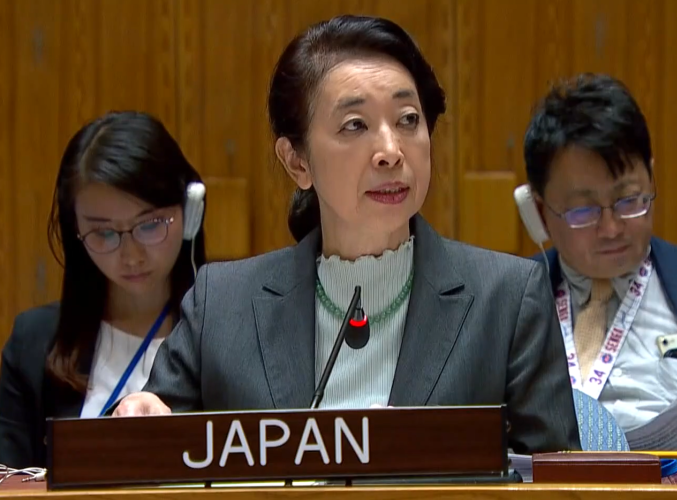児童と武力紛争に関する安保理公開討論における志野大使ステートメント
令和5年7月5日

(As delivered)
I also would like to join colleagues by thanking the Mission of the UAE for the excellent work as the president of the Security Council in June. I also would like to congratulate the team UK and Ambassador Woodward for smooth assumption of the presidency, starting with convening this important annual debate on Children and Armed Conflict. Let me assure our teams full support for the successful presidency in July. I also would like to thank Ms. Gamba, Mr. Abdi, and Ms. Violeta for their informative briefings.
Behind every statistical figure of child victims of armed conflict, children’s futures and dreams are being taken away. Member States and all parties to conflicts must bear in mind the serious impacts of armed conflict that children endure.
The Secretary-General’s latest report shows that, in 2022, there were 27,180 grave violations against children, every single of which is unacceptable, and we should not ignore that there is a greater number of children affected by conflict, which is not reflected in this figure. Moreover, I am particularly distressed to find yet another deplorable aspect of Russia’s aggression against Ukraine in it.
Madam President,
Since the mandate of the SRSG for Children and Armed Conflict was placed, various frameworks and guidelines have been established to improve the situations of children affected by armed conflicts. All stakeholders in the international community should remember the importance of implementation on the ground. No child should live in fear of attacks, nor should they fight on the front lines of armed conflicts. In this regard, let me stress two points.
First, the international community should take preventive measures to ensure children’s safety. According to the Secretary-General's report, some 26% of child casualties are due to explosive ordnance, including explosive remnants of war, improvised explosive devices, and landmines. Japan is convinced that effective mine action contributes to preventing grave violations against children and ensuring their freedom from fear. Therefore, Japan has been supporting mine clearance and mine risk education through UNMAS, UNICEF, and UNDP, which will reduce the risks for children.
Second, access to education is a fundamental human right and a powerful tool to prevent and mitigate conflict. It is regrettable that international humanitarian law and international human rights law are openly ignored, hindering children’s access to school.
Ensuring access to education for children under armed conflict leads to investing in people who will shape and promote more effective, accountable, and resilient institutions and societies. With this belief in mind, Japan has been supporting education programs. For example, this year, the Government of Japan made a contribution to UNESCO to provide emergency digital education and school meals to children who fled from Myanmar. Japan also supports school meals programme through WFP in many countries to help children attend school even under conflict-affected situation.
Madam President,
Children, who are typically already in vulnerable circumstances, are confronted with greater human security challenges combined with armed conflict, climate change, and food insecurity. We are responsible for addressing these human security threats and removing these impediments hindering children’s ability to pave their future.
Japan will continue to work with other Member States, the United Nations system, international humanitarian organizations and civil society organizations in this endeavor.
I thank you, Madam President.
